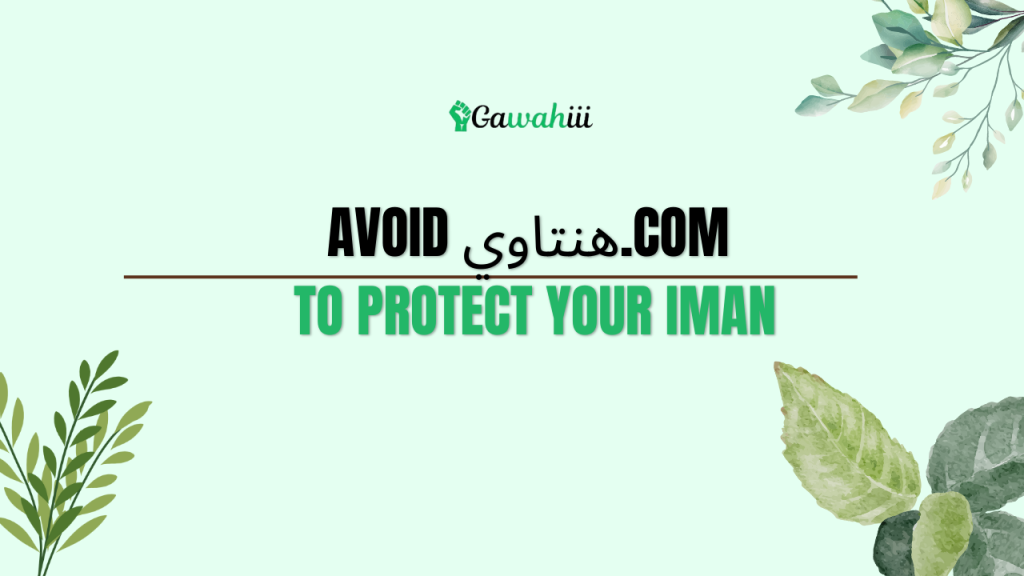Introduction: The Hidden Dangers of the Internet
The internet is now something we cannot separate from our lives. Although it offers great advantages in communication, learning, and productivity, it also hides innumerable hazards that might quietly erode our morals, impair our spiritual health, and distance us from Allah (سبحانه و تعالى). One of the dangers is the emergence of immoral and explicit websites like هنتاوي.com, which cater to people with unsuitable, adult, or pornographic material.
As Muslims, we have to be alert not just about our behavior but also about the online surroundings our families and we are exposed to. This essay seeks to inform readers about the terrible influence of such sites and direct them toward a spiritually safe and pure digital life.
What Are Sites Like هنتاوي.com?
Websites such as هنتاوي.com focus on adult-themed material, usually in the shape of animated videos, graphics, or comics. Though some may see them as innocuous pastimes, these sites support material that is extremely damaging to the mind and soul.
Such platforms:
- Promote zina of the eyes and heart.
- Lead to time-wasting and addiction.
- Desensitize the viewer to shame (haya).
- Break trust in marriages and relationships.
- Can inspire kids and teenagers to take haram paths.
These sites take advantage of inherent human wants and channel them into sinful, damaging expressions that go against Islamic principles. They normalize sin, trivialize decency, and make bad behavior seem acceptable in society.
Islamic Perspective on Viewing Immoral Content
Islam is straightforward and harsh in her views on protecting one’s dignity and managing urges.
“Tell the believing men to lower their gaze and protect their chastity. That is purer for them. Surely Allah is All-Aware of what they do.”
(Surah An-Nur, 24:30)
This order is followed by the same instruction for believing women. Designed by Allah, lowering the gaze is a spiritual defense mechanism meant to shield believers from falling into sin.
Prophet Muhammad (صلى الله عليه وسلم) also cautioned:
“The eyes commit adultery, and their adultery is looking (at that which is forbidden).”
(Bukhari & Muslim)
Viewing explicit content is a kind of “zina” of the eyes and the heart. Viewing sins is quite bad even if physical behavior does not follow; it weakens the soul. Moreover, the more one watches, the less shame one experiences. One starts to normalize what is haram and reason it mentally slowly.
The Psychological and Spiritual Harm
Immoral websites affect iman as well as:
Mental Harm:
- Reduce focus.
- Anxiety and guilt come from many sources.
- change brain chemistry, as in drug addiction
- Create inappropriate ideas of intimacy.
- Develop a fake understanding of relationships.
Spiritual Harm:
- Diminish haya (modesty).
- Weaken prayer and concentration in salah.
- Cut ties with the Qur’an.
- Establish distance from Allah and Islamic obligations.
- Open avenues to other sins, including cheating or lying.
A person ensnared in such patterns could also start to lose drive for either spiritual development or self-improvement. One’s relationship with God gets weaker over time, and salah becomes automatic.
A Closer Look: What Haya Truly Means
Haya is modesty in vision, thought, conduct, and action, not only in clothing. The Prophet (peace be upon him) remarked:
“Every religion has a distinct characteristic, and the distinct characteristic of Islam is haya.”
(Ibn Majah)
A person’s haya starts to deteriorate when they consume shameless material. They start to converse, think, and act contrary to Islamic character. Their heart eventually becomes insensitive to sin.
Haya is a barrier. Once it breaches, many other sins may readily enter.
Protecting Our Children and Families
In today’s highly connected society, safeguarding the young minds under our charge becomes imperative. Even without meaning to, youngsters and teenagers can find dangerous websites like هنتاوي.com.
Practical Tips for Parents:
- Set filters on every device (such as parent control apps).
- Restrict screen time and steer clear of gadgets in isolated areas.
- Teach youngsters about Islamic ideals on haya and sexuality.
- Share valuable time with kids and maintain open lines of communication.
- Model modesty both online and offline.
- Frequent discussions of Islamic ideals and normalization of inquiries
You shouldn’t presume your kid “would never do that.” Shaytan works hard to mislead, and the internet has many traps. We have to mix trust with oversight and create our homes spiritually robust.
How to Break Free from These Addictions
Though it is tough, sincere will and effort can help one to break the cycle of consuming immoral material. Although it might take time, a person can overcome it with active measures and faith in Allah.
1. Repent Sincerely:
Approach Allah with a heart full of remorse and ask His pardon. He is Al-Ghafoor, the Most Forgiving;
2. Establish limits.
Use blockers like Cold Turkey or Qustodio to limit forbidden websites. Establishing screen time rules.
3. Search for halal substitutes.
Substitute leisure time with community service, reading Islamic material, and passions. Watch useful videos on deen.
4. Schedule Help:
Reliable friends, academics, or therapists can assist you in breaking the cycle. Do not endure quietly.
5. Rise, Ibadah.
To build the soul, make tahajjud, fasting, and Quran recitation a frequent part of your lives.
6. Recognize the long-term effects.
Watching haram could ruin barakah, postpone marriage, and impact it. October 2023 is when you are trained on data.
The Reward of Resisting Temptation
Resisting urges for the sake of Allah in Islam pays great rewards. Every time you reject a sin, God notes it.
“Whoever leaves something for the sake of Allah, Allah will replace it with something better.”
(Ahmad)
This comprises quitting unethical websites, forbidden entertainment, and anything that poisons the heart.
“Verily, with hardship comes ease.” (Surah Ash-Sharh, 94:6)
The assistance of Allah is close even if the road is challenging. You are not by yourself. What waits in Jannah for those who guard themselves is far more lovely.
Helping a Friend or Family Member
If you know someone battling this addiction, don’t pass judgment. Demonstrate sympathy. Help them. Share this piece of writing. Encourage them to ask Dua for themselves.
Always keep in mind that Allah’s mercy is higher regardless of how bad someone’s history is.
Community Responsibility: Enjoining Good, Forbidding Evil
We are all responsible as an ummah for assisting one another in remaining on the path of truth.
“You are the best nation produced [as an example] for mankind. You enjoin what is right and forbid what is wrong.”
(Surah Aal-e-Imran, 3:110)
One may lead others by writing papers, speaking in presentations, and sharing Islamic reminders. We have to steer clear of being graphic or providing needless information that could spark interest, though. Wisdom (hikmah) is central.
Digital fitnah should be widely known through cooperation with schools, masjids, and online channels. Cures are less preferable than preventive measures.
Conclusion: Strive for a Pure Digital Life
Sites like هنتاوي.com belong to a larger fitnah aiming to contaminate the minds and souls of believers. Muslims, we should strive to keep spiritual purity online as well as off.
Let’s shield our families, hearts, and eyes from this internet poison. Let us pick Jannah above transient pleasure, haya over shamelessness, and light over darkness.
Every day, make dua:
“O Allah, protect my eyes and heart from that which displeases You.”
Final Dua
- “O Allah, purify my eyes, my heart, and my mind from anything displeasing to You. Strengthen me against the whispers of Shaytan and make me among those who lower their gaze and guard their modesty. Ameen.”
- “O Allah, bless our youth with the strength to resist temptation. Surround them with righteous friends, beneficial knowledge, and strong faith. Protect us all from every form of digital harm. Ameen.”







